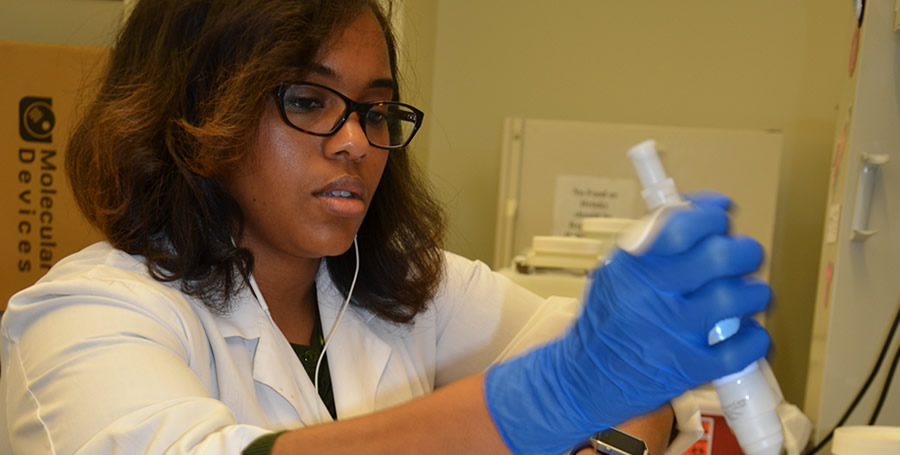Postdoc Q&A: Young researcher shares her passion for learning about hormones' impact on aging

Welcome to our postdoctoral researcher Q&A, where you get to meet Pennington Biomedical's emerging scientists. Dr. Cristal Hill is studying hormones and aging alongside Dr. Chris Morrison. Hill graduated with her undergraduate and masters degrees from Tuskegee University and completed her doctorate at Southern Illinois University in 2016. Prior to her time with Pennington Biomedical, Hill spent time working for the American Diabetes Association. Hear from Hill what fuels her passion for science:
When did you first realize you were interested in science?
- I've been interested in science for almost as long as I can remember. I always questioned "why" and "how," especially about illness and treatments or cures. Throughout my elementary education, I always loved participating in science fairs, and I ended up winning quite a few awards and even competing in the Alabama Regional Science Fair hosted at UAB in the seventh and eighth grade. My summers were filled with STEM (science, technology, engineering and math) programs at either The Alabama School of Fine Arts or Birmingham School District Summer Camps. This interest in science continued throughout my high school education and was greatly nurtured by my biology teacher.
What steps did you take in your career before landing at Pennington Biomedical, and what led you to accept a postdoctoral position at Pennington Biomedical?
- The most important aspect of my work is having a personal connection with my research. Before coming to Pennington Biomedical, I went to a lot of scientific meetings where researchers present their work. I presented my work too, and then I took the next step of publishing my work.
- As I was considering a postdoctoral position, my graduate advisor often passed along publications on aging, growth hormones and metabolism based on studies conducted at Pennington Biomedical, so I knew that great work was already underway here. I also knew that working as a postdoctoral researcher with Dr. Chris Morrison would allow me to broaden my research in metabolism by studying how macronutrients such as dietary protein and hormones such as FGF21 act on the central nervous system to impact glucose metabolism and energy expenditure.
You spent some time working with the American Diabetes Association-can you share about your experience there and how it informs your work as a researcher?
- I worked as chair of African American Initiatives during my time with the ADA in Springfield, Illinois. I spent a lot of time working with local African American Churches, senior citizens groups, local school and health fairs to educate about the high prevalence of diabetes within the African American population.
- As a young investigator, I always felt that what my colleagues and I were learning was information that could be translated from inside the lab into the lives of everyday people—research like how diets high in simple carbohydrates and saturated fats impact the risk of age-related disease.
What aspect of your job are you most passionate about?
- I am most passionate about the "experience"-current and future-as a postdoc at Pennington Biomedical. I say "experience" because I most enjoy learning new ideas and skills. My time at this world-class research facility will allow me to learn new methodologies, report novel findings, network with other scientists, and advance my career.
What impact do you hope that your work at Pennington Biomedical has?
- As a young scientist, I hope that the research we are conducing in Dr. Morrison's lab yields translational benefits that improve the lifespan and quality of life for people around the world. Additionally, I hope our research will give more insight into how hormones, such as FGF21, impact the brain or peripheral tissues to better understand metabolism.
What are your long-term research goals?
- My long term research goal is to investigate hormonal signaling in the brain that influences our food choices. Specifically, I'd like to identify how hormonal signaling that happens within the brain regulates how the body and the brain use glucose, something that ultimately impacts the way we age.
For more information on how you can support this and other projects at LSU’s Pennington Biomedical Research Center, visit www.pbrf.org.


